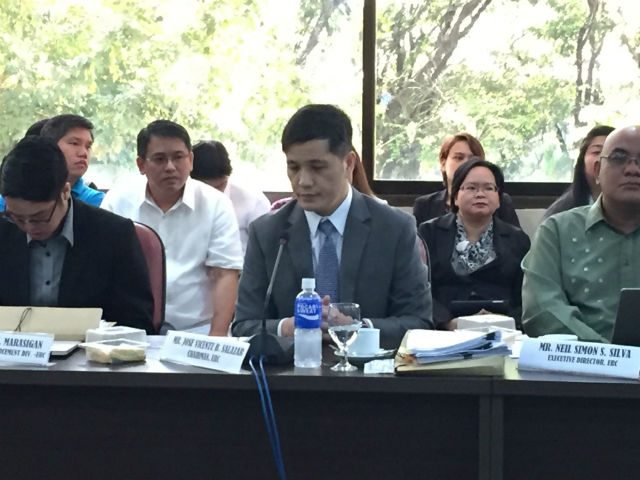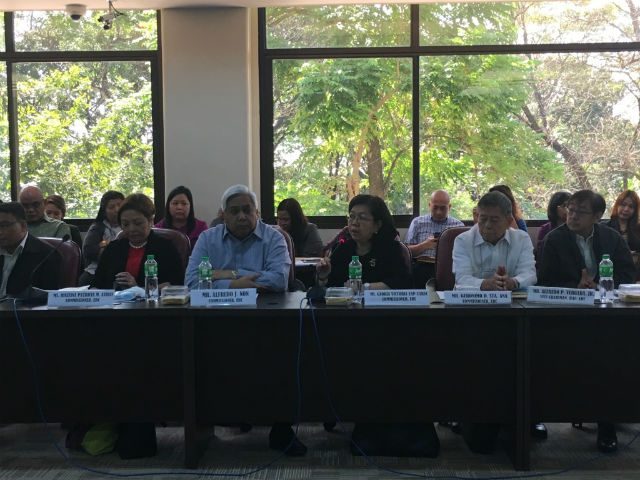SUMMARY
This is AI generated summarization, which may have errors. For context, always refer to the full article.

MANILA, Philippines – Energy Regulatory Commission (ERC) officials testified in a House probe that chairperson and chief executive officer (CEO) Jose Vicente Salazar supposedly attempted to halt their internal inquiry on the suicide of the late director Francisco “Jun” Villa Jr.
On Tuesday, February 7, the House committee on good government and public accountability and the committee on energy started their investigation on the death of Villa.
The former ERC director had shot himself inside his Parañaque City home on November 9, 2016 after he was allegedly forced by superiors to disregard proper procedure in approving contracts and hiring consultants.
In one of his 3 suicide notes, Villa said: “My greatest fear in the bids and awards committee is the AVP (audio-visual presentation) by Luis Morelos which the chairman and CEO, Jose Vicente B. Salazar, chose through a rigged selection system. That will be a criminal act.”
During the hearing, Commissioner Josefina Patricia Asirit was asked if allegations were true that ERC documents were shredded and that the commissioners were barred from testifying freely when the commission started its own investigation on Villa’s suicide.
Asirit denied having any knowledge about the shredding of documents, but she said there was one instance when Salazar tried to stop their internal investigation.
“With respect to shredding of documents, we don’t know anything about that. But with respect to the ability of the chair to have influenced us or to have stopped us from making an inquiry, yes, there was such an incident when the chair was already on leave,” said Asirit.
Salazar denied the allegations thrown at him. He, however, admitted to being friends with Morelos, whom he approached for the ERC’s AVP following two failed biddings for the project.
“I don’t think there is something unusual with a person wanting to help us… After the death of Mr Jun Villa, he (Morelos) was asked why is he providing us with all these concepts. He said, ‘Kawang-gawa lang (Just charity work),'” Salazar said.
Salazar also told congressmen that the ERC did not prepare for a possible suicide among its employees, leading to a “demoralized” commission in the wake of Villa’s death.
Asirit agreed there was an air of distrust among ERC employees.
“We continued in all of our commission deliberations, the meetings, the agenda was still prepared. We continued to make decisions. We continued to meet with the industry, with the consumers, and with the stakeholders,” said Asirit, who had to pause for a few moments as she held back tears.
“But it was very difficult to trust. It was very difficult to trust colleagues. It was very difficult to trust anyone and it was very difficult to find answers and to try and figure out what exactly happened,” she added.
President Rodrigo Duterte already demanded the resignation of ERC officials after receiving reports of rampant corruption in the agency.
But commissioners Asirit, Gloria Victoria Yap-Taruc, and Alfredo Non said doing so would not be in the interest of the ERC. They instead launched an internal probe into the issues surrounding Villa’s suicide late last year.
‘Are you crucifying me?’

Salazar went on leave on December 5, 2016 “to focus on helping in the ongoing and planned inquiries regarding issues” surrounding the ERC and Villa’s death.
An emotional Taruc told the House panels that Salazar approached her on December 12, 2016 regarding their internal probe.
“He actually went to me first. He said, ‘Are you crucifying me by doing an inquiry?’ I said no, we’re not. We’re actually doing this inquiry in order to shed light on what happened. And then he said, ‘Can this be addressed?’ Then I said, ‘Let’s go to the other commissioners and ask how this should be addressed.’ And this is the time that we really had a heated discussion,” narrated Taruc.
As Asirit and Taruc turned emotional while delivering their testimonies, Salazar silently kept his head down.
‘Moral obligation’ to protect Villa
Non, meanwhile, said the ERC’s probe remains unfinished, but promised congressmen they would be relaying their findings to the two House committees.
Non also said he was disappointed that the other commissioners’ names were dragged into the controversy when it was only Salazar’s name mentioned in Villa’s suicide notes.
“My disappointment comes from the fact that if I were the head of an institution and this type of allegations are hurled [at] us, the first obligation is to protect commissioners. Nothing of that sort came, that’s why the commissioners were dragged into the controversy,” said Non.
“So all of us are put in the same light, but as you can see, in terms of the questioning [here during the House probe], only one person is under fire,” he added.
Non said the other commissioners chose not to accost Salazar. But when other employees started approaching them about their concerns about Villa’s death, something had to be done.
“We continued to work, but at the same time, people come to us, people in the ERC who had something to say. That’s something we could not ignore. We could not ignore that we had a moral obligation to protect the image of a colleague who killed himself,” said Non.
The ERC has long been hounded by reports of dubious handling of contracts, the hiring of too many consultants, and questionable appointments. – Rappler.com
Add a comment
How does this make you feel?
There are no comments yet. Add your comment to start the conversation.